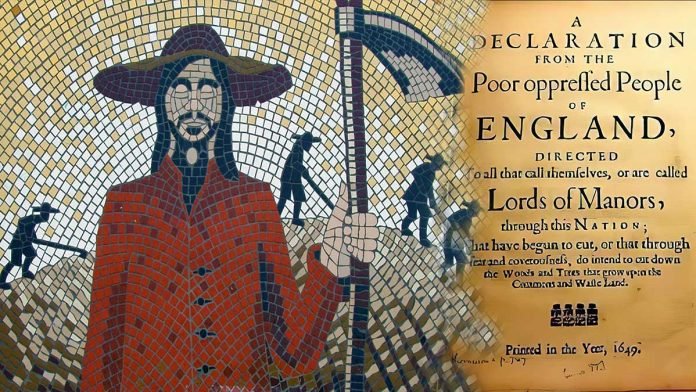Unearthing the Legacy of Gerrard Winstanley, a Man Ahead of His Time
In the annals of British history, one finds stories that have been conveniently buried beneath the grand narratives of kings and conquerors, tales that challenge the established order and stand as defiant milestones of socialism. Among these stories, none shines brighter than that of Gerrard Winstanley and the Diggers—a movement born from the earth, a movement whose echoes still resonate through the corridors of time.
Gerrard Winstanley, a name that should be on the lips of every student of British history, was not born to privilege and power. In October 1609, he came into this world in Wigan, a town known not for opulence but for its modest standing. His family, mere cloth traders, struggled in the ever-fluctuating tides of the textile industry, an industry that shaped the very fabric of English society.
There are no records to confirm young Winstanley’s attendance at the local grammar school, but what we do know is that he ventured into London, the heart of a kingdom marred by the abuse of power. By 1638, he had earned his freedom as a member of the Merchant Taylors’ Company, a milestone for a man of humble origins. Yet, as the English Civil War loomed on the horizon, Winstanley’s life would take a fateful turn.
The outbreak of war in 1642 brought with it upheaval and chaos. For Winstanley, it spelt the ruin of his textile business and left him in the clutches of bankruptcy. But from the ashes of his misfortune emerged a profound shift in perspective. He declared, “For matter of buying and selling, the earth stinks with such unrighteousness.” He saw through the veil of commerce, recognising the corrupting influence of greed.
In 1645 John Lilburne, John Wildman, Richard Overton and William Walwyn formed a new political party called the Levellers. Their political programme included: voting rights for all adult males, annual elections, complete religious freedom, an end to the censorship of books and newspapers, the abolition of the monarchy and the House of Lords, trial by jury, an end to taxation of people earning less than £30 a year and a maximum interest rate of 6%.
It has been claimed that the ideas of people like Lilburne, Wildman, Overton and Walwyn, had an impact on Winstanley. It is also believed that another source of inspiration was the work of John Foxe. However, David Petegorsky, has argued that “to search for the sources of Winstanley’s theological conceptions would be as futile as to attempt to identify the streams that have contributed to the bucket of water one has drawn from the sea.”

The Earth is a Common Treasury for All
With this awakening, Winstanley became the visionary behind the Diggers movement—a bold, audacious endeavour that would challenge the very foundations of society. The Diggers, with their motto “The Earth is a Common Treasury for All,” sought to reclaim the land for the dispossessed, to break free from the yoke of enclosure and oppression.
On waste grounds near Surrey, Winstanley’s “True Leveller” Diggers tilled the earth in communal furrows, planting beans among the barricades. Private land ownership, they declared, defiled nature’s bounty meant for all. To till unutilized soil was not theft, but righteousness.
He famously declared, “For matter of buying and selling, the earth stinks with such unrighteousness.” In a world reeking of corruption, Winstanley saw the futility of trading and profiteering, a bitter realisation for a man born into the merchant class.
And so, the Diggers were born. They staked their claims on the very land they toiled upon, rejecting the notion that William the Conqueror had robbed the English of their birthrights. Winstanley and his followers championed “primitive communism,” a visionary concept in which the commons belonged to the poor, and the land was to be cultivated collectively.
Their writings echoed the sentiments of the Anabaptists, decrying the inherent corruption of all institutions. Winstanley’s solution was radical yet compelling – all officials should be elected annually to prevent the corrosion of power. He understood the human heart’s susceptibility to the clouds of covetousness and vanity that darkened the soul.
Digger pamphlet by Gerrard Winstanley

He saw institutions as inherently corrupt and argued for the yearly election of officials to prevent the accumulation of power. His words resonated with the belief that unchecked authority led to moral decay, stating, “When public officers remain long in place of judicature, they will degenerate from the bounds of humility, honesty, and tender care of brethren.”
On the 20th of April, Gerrard Winstanley and William Everard confronted General Fairfax in London, their heads held high and their hats firmly in place—a symbolic defiance against tyranny. They articulated a vision of justice that sought not to dismantle private property but to reclaim the commons, the rightful inheritance of the poor and downtrodden.
Their message was clear: England had endured tyranny since the Norman Conquest, and they aimed to reclaim what was rightfully the people’s—the commons.
The Diggers sought to cultivate the wastelands collectively, offering sustenance to the downtrodden. In their quest, they became pioneers of a new vision, a utopian ideal that challenged the status quo.
In the shadows of history, the Diggers’ struggle for equality and justice was a milestone of socialism, a testament to the enduring spirit of those who dare to challenge the status quo. Gerrard Winstanley’s legacy endures, reminding us that in the soil of discontent, the seeds of change can sprout, even in the darkest of times.
The Diggers’ dream of a common treasury still resonates, a beacon of hope for those who champion the cause of the dispossessed in our modern world.
Support Independent Journalism Today
Our unwavering dedication is to provide you with unbiased news, diverse perspectives, and insightful opinions. We're on a mission to ensure that those in positions of power are held accountable for their actions, but we can't do it alone. Labour Heartlands is primarily funded by me, Paul Knaggs, and by the generous contributions of readers like you. Your donations keep us going and help us uphold the principles of independent journalism. Join us in our quest for truth, transparency, and accountability – donate today and be a part of our mission!
Like everyone else, we're facing challenges, and we need your help to stay online and continue providing crucial journalism. Every contribution, no matter how small, goes a long way in helping us thrive. By becoming one of our donors, you become a vital part of our mission to uncover the truth and uphold the values of democracy.
While we maintain our independence from political affiliations, we stand united against corruption, injustice, and the erosion of free speech, truth, and democracy. We believe in the power of accurate information in a democracy, and we consider facts non-negotiable.
Your support, no matter the amount, can make a significant impact. Together, we can make a difference and continue our journey toward a more informed and just society.
Thank you for supporting Labour Heartlands












